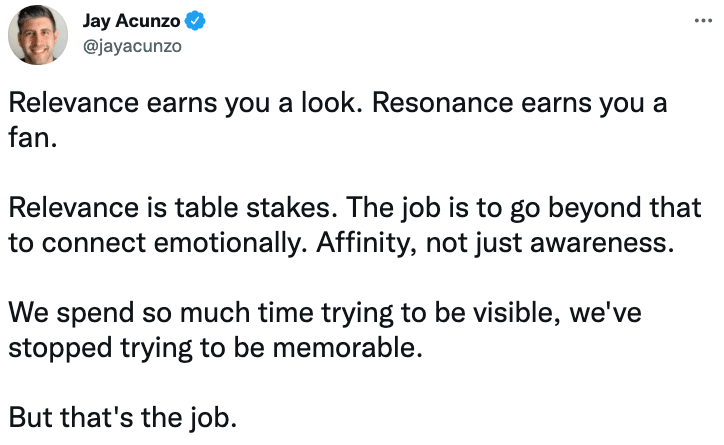Search Engine Optimization (SEO) has become an essential part of any digital marketing plan. In fact, 85% of consumers do online research before making an online purchase. If you’re trying to compete in the online marketplace, it’s important to make sure you’re connecting with those customers!
Unfortunately, too many companies focus on creating their websites for search engines rather than the real people who visit. This might lead to strong rankings, but in the end, you’ll alienate potential customers and lose sales.

Source: Jay Acunzo on Twitter
When you use empathetic language, you’ll not only do well in search, but you’ll also give your visitors an excellent user experience. Let’s take a look at the power of empathetic language.
Empathetic Content Addresses Emotions and Boosts Sales
As Zig Ziglar famously said, people buy based on emotions. They then justify that purchase with logic. That’s why your website needs to appeal to both but start with an emotional connection.
Effective sales copy on your website will put the focus on the visitor. You’ll talk about their needs, how they feel, and how your product or service can improve their situation. This is empathetic at its core, and it will help build a relationship between the customer and your company.

When you’ve addressed a visitor’s emotions, you’ve positioned yourself as the proper solution to their needs. That’s when you can move forward and capture the sale.
Empathy Connects With User Intent
Understanding user intent means you know what the visitor needs when they get to your website and deliver it. In essence, it’s recognizing what part of the sales funnel you’re in. Search Term A might indicate a user who is just beginning to research solutions, while Search Term B might show that someone is ready to buy.
Is the content that includes Search Term A focused on that early-stage interest? Is the page with Search Term B a sales page that moves the user to make a purchase?
If not, you’re missing your opportunity to connect with visitors and move them through your sales funnel. Remember, no company wants someone to find their website at random. Instead, you’re hoping a customer will connect with you exactly when they need what you offer.
The way to accomplish that is through using empathetic language in your SEO. The content around each keyword phrase will meet the visitor where they are and move them to the next stage in the business relationship.
Empathy Helps You Do Better with Both Google and Customers
Unfortunately, some marketers feel like empathetic language is too soft for real SEO. Instead, they want to focus on hard data and keywords and phrases that people regularly search for.

What these folks forget is that Google is entirely focused on delivering an excellent user experience to everyone who uses the engine. For instance, websites need to be optimized for mobile phones to rank well because so many people use mobile devices to access things like their blogs and the rest of the internet. Google wants the websites at the top of page one to be perfect for the user’s needs.
The more a visitor interacts with your website and the longer they stay there, the more likely you are to maintain a high search ranking because it shows Google that you’re highly relevant. Use empathetic language focused on customer needs will help connect with customers and improve your ranking. This will draw in more visitors, improve your sales, and help grow your business.
Empathetic language is a win-win that helps line your SEO goals up with Google’s overall purpose.
The Right SEO Uses the Customer’s Language
To seem authoritative and professional, some businesses fill their website with hard-to-read content and jargon. Unfortunately, this doesn’t impress your potential customers — jargon kills the customer experience.
When you use the customer’s language — the words and phrases they use to describe their problems and feelings — you relate to them. This is vital given the variety of views in any target audience. It’s helpful to have a diverse workforce that can communicate effectively to different segments of your customer base through your website.
Pay attention to reviews and social media to find out how your ideal customer talks about their needs. Then, use that same language on your website. Not only will you connect with them emotionally when they visit your site, but you’ll also be more likely to capture the search terms they enter into Google.
Using the customer’s language includes both common cultural phrases and sensitivity to intercultural communication. You don’t want to try too hard and end up offending the people you are working to attract.
Is Your SEO Empathetic?
Creating high-performing content isn’t easy, especially when you’re trying to please both search engines and discerning customers. Using empathetic language on your website, however, can give you a big head start.
When you write for your visitors, not just for Google, you end up pleasing both. Emotional language builds connections with visitors and helps drive sales. In the end, everyone wins!
If you want to learn more about digital content strategy and how having the right platform can lay a solid foundation, we’re here to help. Schedule a quick convo today!